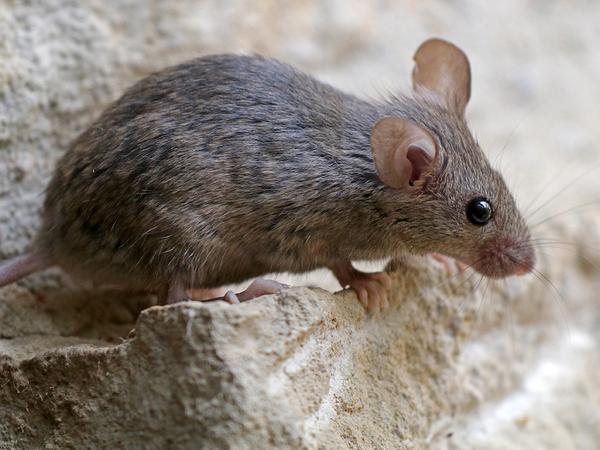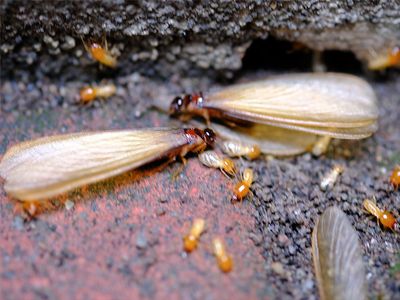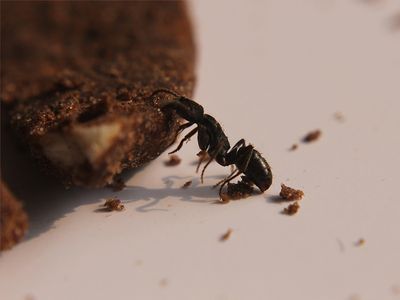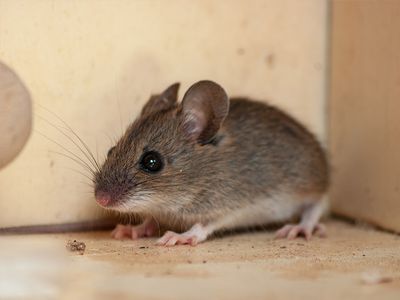What do mice look like?
Mice are tiny rodents with black eyes, long whiskers, and a conical nose. Their long, scaly tail is about the same length as their body—compared to a rat's tail, it is thin. Mice have short fur, and the color varies with species. The most common indoor mouse in the world is the house mouse, which is usually gray in appearance. The most common yard mouse is the deer mouse. It has a tawny top and white underbelly.

Do mice bite humans?
Mice have strong teeth and can bite, but you are not likely to ever get bitten by a mouse unless you handle one or they feel threatened or cornered.
Are mice dangerous?
Yes. Mice are considered dangerous animals, but not because they can bite. Here are a few facts you should know about mice:
- A tiny mouse can have as many as a hundred seed ticks on its body. Ticks are associated with a long list of diseases, including Lyme disease and Rocky Mountain spotted fever.
- A tiny mouse can have many fleas on it, and fleas can transmit typhus, bartonellosis, and other diseases.
- Mice climb in dumpsters, trash cans, and sewers. In these unsanitary locations, they can pick up and spread harmful bacteria that impact human health.
- Mice leave their feces, urine, and saliva behind as they explore indoor spaces, and their waste material is considered a health hazard.
What problems do mice cause?
When a mouse gets into your home, you can expect it to do the same things indoors that it does outdoors. Here are a few facts to consider:
- Mice leave fecal matter in large quantities. These tiny pellets are a source of disease and are able to damage stored items, insulation, and more.
- They mark their areas and use the scent for navigation. As a mouse population grows, so does the scent of urine and the contamination. Large infestations can lead to the formation of urine pillars.
- They chew on stored furniture and rip out the stuffing in cushions and pillows.
- They chew holes in shirts and other clothing.
- They chew on building materials to create access holes.
- Holes created by mice can allow rainwater, moisture, or humidity to enter. A moisture problem can lead to wood rot, mold, and other issues.
A little mouse isn't looking to harm you; however, its presence in your home is a risk to your property and health.
How do mice get inside?
There are a surprising number of ways a mouse can find its way indoors. Some are likely to shock you. Let's begin with the most obvious ways.
- These small rodents chew on wood and create holes that are large enough to squeeze into. A full-grown mouse only needs a gap the width of a dime.
- Mice chew on weatherstripping and door sweeps if they find small holes that they can make larger.
- They gnaw on concrete and can make small gaps around pipes and utility wires large enough for entry.
- These pests can scale pipes that run up the sides of man-made structures.
- Mice sometimes climb trees and run along branches to get onto roofs. Once a mouse is on a roof, it can chew through building materials to enter roof troughs or attic spaces.
If you hope to keep mice out of your home, you need to consider every entry point, from top to bottom.
Where do mice hide in homes?
Mice want to live as close to food as possible. The most common nesting location is the wall voids of kitchens and pantries. But a mouse also likes warmth. In many cases, a mouse will nest in a warm attic and travel up and down through wall voids to get to food sources within a home.
Will mice stay away from a clean house?
There is no doubt that mice love cluttered homes with lots of food debris. But a home without these conditions will not keep mice away. A mouse looks at your home the same way it looks at a tree hole or log void. It offers shelter. A mouse doesn't need to find anything in your home but a safe place to hide.
How do you get rid of mice?
If you’ve noticed signs of mice or have seen a live rodent in or around your home, contact Evergreen Pest Solutions right away. Our local pest control team offers effective pest control services for homes and businesses that eliminate active rodent infestations and prevent new ones from developing.
How can I prevent a mouse infestation?
Home maintenance, weatherproofing, and targeted rodent-proofing can deter mice. Combine these with yard maintenance and sanitation, and you'll have a strong layer of protection. Unfortunately, these take time and effort. If you want an easier and stress-free solution, contact a licensed pest management professional for rodent control. A professional will apply bait, traps, and other methods to keep your home rodent-free.








